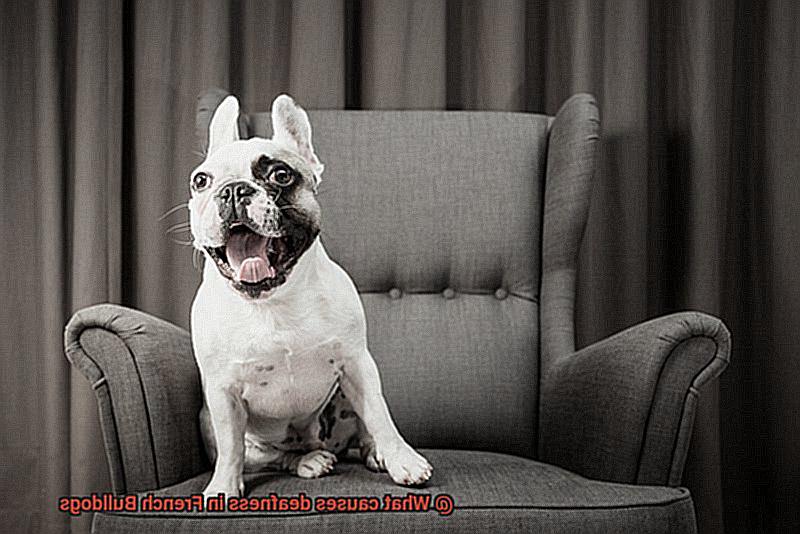What causes deafness in French Bulldogs?
Deafness can have a profound impact on the lives of both humans and animals. Unfortunately, our beloved French Bulldogs are more susceptible to this condition due to their unique genetic makeup. It’s crucial for breeders, owners, and veterinarians to understand the causes of deafness in French Bulldogs, as early detection and management are key.
While there are various factors that can contribute to deafness in dogs, French Bulldogs have a higher predisposition due to their genes. The primary culprit lies in their genetic inheritance, specifically related to a coat color variation called “merle.” This eye-catching pattern, with its diluted pigmentation patches, may be visually appealing but is associated with an increased risk of deafness.
In this blog post, we’ll delve into the genetic aspects behind deafness in French Bulldogs. We’ll explore how their coat color variations affect their hearing abilities and why it’s so significant. Additionally, we’ll discuss other potential causes like infections, injuries, and aging to give you a comprehensive overview of this prevalent auditory condition in French Bulldogs. So stick around. We’re here to help you better understand this concerning issue and navigate it for the well-being of your furry friends.
Hereditary Causes of Deafness in French Bulldogs
Contents
- 1 Hereditary Causes of Deafness in French Bulldogs
- 2 The Piebald Gene and its Link to Deafness
- 3 The Merle Gene and its Link to Deafness
- 4 Environmental Causes of Deafness in French Bulldogs
- 5 Drug-Induced Deafness in French Bulldogs
- 6 Age-Related Hearing Loss in French Bulldogs
- 7 Risk Factors for Developing Deafness in French Bulldogs
- 8 Diagnosing Hearing Loss in French Bulldogs
- 9 Conclusion
French Bulldogs are cherished companions known for their distinctive appearance and endearing personalities. However, it is crucial for owners to be aware that this breed is susceptible to hereditary deafness. In this article, we will delve into the multifaceted causes of deafness in French Bulldogs, including genetic mutations, environmental influences, and age-related hearing loss. By comprehending these causes, owners can take proactive measures to ensure the optimal care for their furry friends.
Congenital Sensorineural Deafness:
The foremost hereditary cause of deafness in French Bulldogs is congenital sensorineural deafness. This condition arises from the malfunctioning of nerve pathways responsible for hearing. It is often associated with a mutation in the connexin 26 gene, which plays a pivotal role in the development and functioning of the inner ear. This mutation can disrupt cochlear development and impair sound signal processing.
Progressive Hearing Loss:
Progressive hearing loss is another hereditary cause observed in French Bulldogs. This condition involves a gradual deterioration of hearing abilities over time. While certain genes may predispose French Bulldogs to this condition, environmental factors such as exposure to loud noises or certain medications can exacerbate the progression of hearing loss.
Other Hereditary Conditions:
In addition to congenital sensorineural deafness and progressive hearing loss, French Bulldogs may experience other hereditary conditions that contribute to deafness. These conditions encompass vestibular dysfunction, which impacts balance maintenance, and Usher syndrome, characterized by both hearing and vision loss.
Genetic Testing and Responsible Breeding:
To mitigate the risk of hereditary deafness in French Bulldogs, responsible breeding practices are imperative. Breeders should meticulously screen their breeding dogs for genetic mutations or abnormalities linked to deafness. Genetic testing can identify specific mutations like the Piebald or Merle gene, empowering breeders to make informed decisions and diminish the incidence of deafness in future generations.
Environmental Factors and Age-Related Hearing Loss:
In addition to genetics, environmental factors can influence deafness in French Bulldogs. Prolonged exposure to loud noises or a single traumatic event can damage the delicate structures of the inner ear, leading to hearing loss. Furthermore, age-related hearing loss (presbycusis) is a natural part of the aging process in French Bulldogs and may manifest gradually over time.
The Piebald Gene and its Link to Deafness
In this enlightening article, we will explore the complex causes of deafness in French Bulldogs, examining genetic mutations, environmental influences, and even age-related hearing loss. By understanding these causes, owners can take proactive measures to ensure their furry friends receive the best possible care.
One particular gene, known as the Piebald gene, is responsible for the distinctive coat pattern seen in many dog breeds, including French Bulldogs. Dogs carrying the Piebald gene have patches of white fur mixed with their base color. Unfortunately, this gene is also linked to an increased risk of deafness in French Bulldogs.
The deafness associated with the Piebald gene is known as congenital sensorineural deafness. This means that the dog is born deaf due to a problem with the inner ear or auditory nerve. The Piebald gene affects the development of pigment-producing cells called melanocytes, which are responsible for the color of fur, skin, and eyes. When melanocytes do not migrate properly during embryonic development, it can result in areas of white fur and an increased risk of deafness.
It is important to note that not all French Bulldogs carrying the Piebald gene will be deaf. The risk of deafness varies depending on the extent of white markings on the dog and other genetic factors. Dogs with predominantly white coats or those with a large amount of white on their heads are more likely to be deaf than those with minimal white markings.
Breeding two French Bulldogs carrying the Piebald gene increases the likelihood of producing puppies with congenital sensorineural deafness.
The Merle Gene and its Link to Deafness
In this article, we will explore the fascinating world of the Merle gene and its link to hearing impairments in French Bulldogs. So, grab a cup of coffee and let’s dive right in.
Understanding the Merle Gene:
The Merle gene is responsible for creating the marbled or mottled coat pattern in French Bulldogs. This dominant gene means that if a dog inherits even one copy from either parent, it will exhibit the Merle coat pattern. However, having two copies of the Merle gene can result in more severe health issues, including deafness.
The Connection with Deafness:
Breeding two French Bulldogs carrying the Merle gene increases the risk of producing puppies with hearing impairments. While the exact mechanism behind how the Merle gene causes deafness in French Bulldogs remains a mystery, studies suggest that abnormalities in the development of the inner ear may be involved.
Identifying Deafness:
Regular hearing tests should be conducted on French Bulldogs with a Merle coat pattern to identify any hearing loss early on. Look out for signs such as not responding to sounds or being easily startled, as they may indicate hearing issues.
Responsible Breeding Practices:
To reduce the incidence of deafness in French Bulldogs, responsible breeding practices are crucial. Breeding two dogs with the Merle gene together significantly increases the risk of producing deaf puppies. Therefore, it is important for breeders and owners to be aware of this risk and refrain from breeding dogs carrying the Merle gene.
Environmental Causes of Deafness in French Bulldogs
French Bulldogs are beloved companions known for their lively personalities. However, these adorable dogs are susceptible to deafness caused by various environmental factors. In this article, we will explore the different causes of deafness in French Bulldogs and provide practical tips to safeguard their hearing.
Loud Noises – A Silent Threat:
French Bulldogs have delicate ears that make them particularly vulnerable to noise-induced hearing loss. Prolonged exposure to loud sounds like fireworks, construction noise, or even everyday household appliances can gradually damage their ears. To protect your Frenchie’s hearing, reduce their exposure to loud noises whenever possible. Consider using specially designed ear protection for dogs in noisy environments.
Ototoxic Medications:
Certain medications, such as antibiotics or chemotherapy drugs, can have a toxic effect on the sensitive structures of a dog’s ear. When administering medications, consult with your veterinarian about potential side effects on your French Bulldog’s hearing health. Being cautious can prevent any inadvertent harm.
Ear Infections – Nip Them in the Bud:
Ear infections are a common cause of deafness in French Bulldogs. Bacteria, yeast, or mites can invade the ear canal, leading to permanent damage if left untreated. Regularly inspect your Frenchie’s ears for signs of infection such as redness, swelling, or an unpleasant odor. Maintain good ear hygiene by keeping their ears clean and dry. Seek veterinary care promptly if you suspect an infection.
Harmful Chemicals and Toxins:
Exposure to certain chemicals or toxins in the environment can harm the delicate tissues of a French Bulldog’s ears and result in hearing loss. Avoid using pesticides or cleaning products that contain harmful chemicals around your dog. Opt for pet-friendly alternatives and ensure proper ventilation when using any potentially toxic substances.

Pigment-Associated Deafness:
French Bulldogs with white or merle coat colors are more prone to pigment-associated deafness. This condition occurs due to a lack of pigmentation in the inner ear, impairing its development and function. If you plan to breed French Bulldogs, consult with a reputable breeder who takes necessary precautions to minimize the risk of this condition.
Drug-Induced Deafness in French Bulldogs
French Bulldog owners understand the importance of maintaining the health and happiness of their beloved pets. However, one serious concern that all Frenchie owners should be aware of is drug-induced deafness. In particular, aminoglycoside antibiotics have been found to have detrimental effects on the hearing of French Bulldogs.
Aminoglycoside antibiotics are commonly used to treat bacterial infections in dogs. While they are effective in fighting infections, they can also have ototoxic effects, meaning they can damage the delicate structures in the inner ear responsible for hearing. This damage can result in partial or even complete hearing loss in French Bulldogs.
The exact mechanism by which aminoglycoside antibiotics cause deafness is not fully understood. However, it is believed that these drugs disrupt the function of hair cells in the cochlea, the spiral-shaped structure in the inner ear that converts sound vibrations into electrical signals for the brain. Once these hair cells are damaged, hearing loss occurs.
To minimize the risk of drug-induced deafness in French Bulldogs, it is important to have a conversation with your veterinarian about alternative treatment options if aminoglycoside antibiotics are being considered. In some cases, there may be other medications available that carry a lower risk of causing deafness. If aminoglycoside antibiotics are necessary, close monitoring of your Frenchie’s hearing during and after treatment is crucial. Any changes or concerns should be reported immediately to your vet.

It is worth noting that aminoglycoside antibiotics are not the only medications that can cause deafness in French Bulldogs. Loop diuretics, commonly used to treat conditions such as heart failure and fluid retention, have also been linked to hearing loss. Additionally, certain chemotherapy drugs, like cisplatin, can have ototoxic effects. Therefore, it is essential to discuss any potential side effects with your vet before starting any medications and explore alternative options if available.
Age-Related Hearing Loss in French Bulldogs
As a devoted French Bulldog owner, you understand the importance of safeguarding your furry companion’s well-being. One common concern that aging French Bulldogs face is age-related hearing loss, also known as presbycusis. In this comprehensive article, we will delve into the causes and symptoms of this condition, equipping you with valuable knowledge to provide optimal care for your beloved pet.
Causes of Age-Related Hearing Loss in French Bulldogs:
- Genetic Predisposition: Research has revealed that specific genetic mutations can heighten the vulnerability of French Bulldogs to age-related hearing loss. While this factor lies beyond our control, comprehending your Frenchie’s genetic background empowers you to proactively monitor their auditory health.
- Environmental Factors: Exposure to loud noises, infections, or ototoxic medications can contribute to hearing loss in French Bulldogs. Safeguarding your Frenchie’s ears from excessively loud sounds and exercising caution when administering medications are essential precautions to protect their hearing.
- Natural Aging Processes: Just like humans, dogs undergo degenerative changes in their ears as they age. Delicate structures within the inner ear, including hair cells and auditory nerves, may sustain damage or deteriorate over time, leading to hearing loss.
Symptoms of Age-Related Hearing Loss in French Bulldogs:
- Difficulty Responding to Commands or Sounds: If you notice a decreased responsiveness in your Frenchie when it comes to your voice or commands, it may indicate hearing loss. Pay close attention to any behavioral changes related to auditory stimuli.
- Increased Startle Response: Dogs experiencing age-related hearing loss may startle more easily as they are unable to hear approaching sounds.
- Decreased Responsiveness to Auditory Stimuli: Your Frenchie may exhibit diminished interest in sounds that previously excited them, such as the doorbell or the squeak of their favorite toy.
It is crucial for owners of aging French Bulldogs to monitor their pets’ hearing abilities and seek veterinary care if they suspect any signs of hearing loss. Although age-related hearing loss cannot be reversed, there are strategies and accommodations that can improve your Frenchie’s quality of life.
Strategies for Supporting French Bulldogs with Age-Related Hearing Loss:
- Provide a Safe and Quiet Environment: Creating a calm and serene living space minimizes unnecessary noise, reducing stress on your Frenchie’s ears.
- Minimize Exposure to Loud Noises: Avoid exposing your Frenchie to loud sounds such as fireworks, construction sites, or blaring music. If unavoidable, use ear protection specifically designed for dogs.
- Seek Professional Guidance: Veterinary professionals can conduct thorough examinations and recommend appropriate interventions or assistive devices, such as hearing aids or vibrating collars, to enhance your Frenchie’s auditory experience.
Risk Factors for Developing Deafness in French Bulldogs
French Bulldogs have a higher susceptibility to hearing loss compared to other breeds, but fear not. By knowing what to watch out for, you can take proactive steps to prevent or manage this condition. So, let’s dive into the fascinating world of deafness risk factors for our beloved Frenchies.
First on our list are genetics. Certain genetic mutations, like the Piebald and Merle genes, can increase the likelihood of deafness in French Bulldogs. Breeders must carefully select mating pairs to avoid these genetic mutations and reduce the risk in offspring.
Next up are environmental factors. Loud noises, from fireworks to excessive barking, can wreak havoc on their delicate ears. Minimizing exposure to loud noises and creating a serene environment is paramount.
Medications and medical conditions also come into play. Some medications, like certain antibiotics, have been linked to hearing loss in dogs. Additionally, ear infections can pose a threat. Regular vet check-ups and swift treatment can help reduce the risk.
And let’s not forget aging. Just like us humans, dogs’ hearing abilities may naturally decline with age. Keeping a keen eye on any changes in their hearing and seeking veterinary attention if needed is vital.
Remember, not all French Bulldogs with these risk factors will develop deafness. However, by being aware of the potential risks and taking proactive measures, you can greatly improve their auditory health and overall quality of life.
Diagnosing Hearing Loss in French Bulldogs
Whether it’s a congenital condition or acquired later in life, diagnosing hearing loss in French Bulldogs is crucial for their overall well-being. In this blog post, we will delve into the importance of early detection, explore the methods used by veterinarians to diagnose hearing loss, and highlight the challenges faced in diagnosing this condition in French Bulldogs.
The Importance of Early Detection:
Similar to humans, French Bulldogs can experience congenital or acquired hearing loss. Identifying hearing loss early on is vital as it allows for timely intervention and improves the quality of life for our furry friends. Early detection can prevent behavioral issues and accidents resulting from a lack of response to auditory cues. Let’s be proactive and ensure that our furry companions can fully experience the world around them.
Methods for Diagnosing Hearing Loss:
Veterinarians employ various techniques to diagnose hearing loss in French Bulldogs. One commonly used method is the Brainstem Auditory Evoked Response (BAER) test, which measures brain activity in response to sound stimuli. This test helps determine the severity and type of hearing loss. Additionally, a thorough physical examination of the ears is conducted to identify any visible signs of infection or abnormalities.

Challenges and Signs to Look Out For:
Diagnosing hearing loss in French Bulldogs may present unique challenges due to their brachycephalic anatomy. However, veterinarians with audiology expertise or experience in diagnosing hearing loss in dogs are equipped to address these challenges effectively. As responsible pet owners, we should also monitor for potential signs of hearing loss. If our Frenchies appear unresponsive to sounds, struggle with following commands, or exhibit excessive barking without apparent cause, it is imperative to seek professional guidance.
oMxaqG87CLg” >
Conclusion
Deafness in French Bulldogs can be attributed to a variety of factors. One of the main causes is genetics, as certain genes can carry the potential for hearing loss. Additionally, infections such as otitis media or external ear canal infections can damage the delicate structures of the ear and lead to deafness. Trauma, such as head injuries or exposure to loud noises, can also result in hearing impairment. Furthermore, certain medications and toxins have been linked to deafness in dogs.
It is important for French Bulldog owners to be aware of these potential causes and take preventive measures to protect their pet’s hearing. Regular veterinary check-ups can help identify any underlying health issues that may contribute to deafness. Additionally, avoiding loud environments and providing proper ear care can minimize the risk of damage to the ears.
In conclusion, while deafness in French Bulldogs can have various causes, understanding these factors and taking appropriate precautions can help preserve their hearing health.




